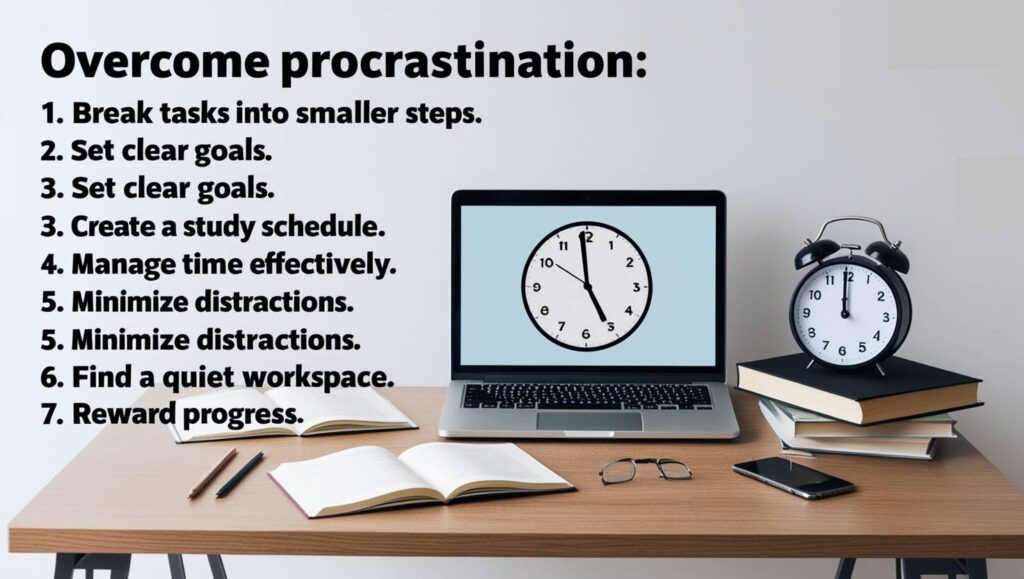Procrastination is not just a habit; it is a complex psychological behavior rooted in emotions, fear, and brain function. Understanding why we delay tasks and how to rewire our mindset is the key to overcoming procrastination and unlocking true productivity.

The Science Behind Procrastination
Procrastination is not just about poor time management; it is deeply rooted in brain function. Neuroscientific research suggests that procrastination is influenced by two key areas of the brain: the limbic system and the prefrontal cortex. The limbic system, which controls emotions and pleasure-seeking behavior, pushes individuals toward immediate gratification. On the other hand, the prefrontal cortex is responsible for rational thinking, decision-making, and long-term planning. However, when the limbic system dominates the prefrontal cortex, impulsivity increases, and individuals struggle to focus on tasks that require effort.
Furthermore, studies indicate that dopamine, a neurotransmitter linked to pleasure and reward, plays a significant role in procrastination. Engaging in enjoyable distractions, such as watching videos or browsing social media, releases dopamine, reinforcing the habit of delaying tasks. Over time, the brain becomes conditioned to seek immediate rewards rather than tackling more demanding but ultimately rewarding long-term goals.
Moreover, the concept of temporal discounting explains why people prioritize short-term rewards over long-term benefits. Essentially, the brain perceives future rewards as less valuable than immediate gratification. This explains why students often postpone studying until the last moment or why professionals delay important projects despite knowing the consequences.
Emotional Triggers of Procrastination
At its core, procrastination is not just about time management but is often driven by emotions rather than logic. Emotional triggers significantly impact a person’s tendency to procrastinate, making it challenging to break the cycle.
Fear of Failure and Self-Doubt
One of the most common reasons people procrastinate is the fear of failure. When individuals feel uncertain about their abilities, they delay tasks to avoid the possibility of underperforming. For instance, a student who doubts their understanding of a subject may put off studying to avoid facing the reality of their struggles. Similarly, an employee hesitant about presenting their ideas might delay preparing their presentation out of fear that it will not be well received.
Perfectionism and High Expectations
Another significant emotional trigger is perfectionism. While striving for excellence can be beneficial, perfectionists often set unrealistically high standards for themselves. As a result, they hesitate to start or complete tasks unless they feel fully prepared. This creates a cycle of avoidance, where they spend excessive time planning and revising instead of taking meaningful action.
Anxiety and Stress
Procrastination can also be a coping mechanism for individuals dealing with anxiety or stress. When tasks seem overwhelming, people may avoid them entirely to temporarily relieve their discomfort. Unfortunately, this avoidance only increases anxiety in the long run, leading to a vicious cycle of stress and inaction.
The Consequences of Procrastination
Mental and Emotional Toll
Procrastination does not just affect productivity—it also has serious mental health consequences. The stress of unfinished tasks lingers in the subconscious, increasing anxiety and guilt. As deadlines approach, procrastinators often experience panic, leading to rushed work and dissatisfaction. Over time, chronic procrastination can contribute to depression, low self-esteem, and a persistent sense of failure.
Impact on Productivity and Success
Beyond mental well-being, procrastination also affects professional and academic success. When tasks are continuously delayed, opportunities are missed. A student who procrastinates on assignments may receive lower grades, affecting their academic future. Likewise, an employee who delays important projects may struggle to advance in their career. As procrastination becomes a habit, individuals find it harder to meet goals, leading to frustration and decreased motivation.
Why Do We Procrastinate?
Instant Gratification vs. Long-Term Rewards
One of the most significant reasons for procrastination is the natural tendency to seek instant gratification. Engaging in enjoyable activities like scrolling through social media, playing video games, or watching television provides immediate pleasure. In contrast, working on long-term goals—such as studying for exams or completing work projects—requires sustained effort without instant rewards. As a result, people often choose short-term pleasure over long-term benefits.
The Role of Perfectionism
Perfectionists are particularly prone to procrastination. Their fear of producing subpar work prevents them from starting or completing tasks. Instead of making gradual progress, they wait for the “perfect moment,” which rarely comes. This mindset leads to unnecessary delays and increases stress as deadlines approach.
Decision Fatigue and Overwhelm
Having too many choices can be paralyzing. When faced with multiple tasks, the brain struggles to prioritize, leading to decision fatigue. As mental exhaustion builds up, individuals become more likely to avoid making decisions altogether, resulting in inaction. Additionally, overwhelming workloads can cause people to freeze rather than take the first step.
Effective Strategies to Overcome Procrastination
Cultivating Self-Awareness
Recognizing procrastination patterns is the foundation for overcoming them. Many people delay tasks without fully understanding why, leading to frustration and guilt. Keeping a journal to track habits, emotional triggers, and thought patterns can provide valuable insights.
For instance, some individuals may notice they procrastinate when a task feels too difficult, while others may delay work due to a fear of failure. Identifying these tendencies makes it easier to develop personalized strategies. Self-awareness allows individuals to shift from reactive behaviors to proactive solutions, ultimately helping them take control of their actions.
The 5-Minute Rule
One of the most effective ways to break procrastination is the 5-minute rule. The idea is simple: commit to working on a task for just five minutes. This approach helps overcome the mental barrier that makes starting seem daunting.
Psychologically, the hardest part of any task is getting started. Once a person begins, their brain adapts to the activity, and the initial resistance fades. Many people find that after five minutes, they no longer feel the urge to stop, as momentum naturally builds. This technique is particularly helpful for individuals who struggle with motivation or feel paralyzed by perfectionism.
Moreover, the 5-minute rule works well for any type of task—whether it’s writing a report, cleaning a workspace, or preparing for a presentation. By focusing on small efforts rather than the entire workload, individuals make progress without feeling overwhelmed.
Breaking Tasks into Manageable Steps
Large projects often feel intimidating, leading individuals to avoid them entirely. Breaking tasks into smaller, more manageable steps makes them appear less daunting. Instead of focusing on the project as a whole, individuals should divide it into actionable sections.
For example, if someone needs to write a research paper, they can break it down into:
- Selecting a topic
- Conducting research
- Creating an outline
- Writing the introduction
- Completing each section separately
This approach reduces anxiety by providing a sense of accomplishment with each completed step. Additionally, it prevents the mental exhaustion that often arises from trying to tackle everything at once. By celebrating small wins, individuals reinforce positive habits and stay motivated throughout the process.
Time Management Techniques
Effective time management plays a crucial role in overcoming procrastination. Without a clear structure, tasks can feel endless, leading to distractions and inefficiency. Fortunately, several proven techniques help individuals stay on track:
- The Pomodoro Technique: This method involves working in focused 25-minute intervals (Pomodoros) followed by short 5-minute breaks. After completing four Pomodoros, a longer break is taken. This strategy enhances concentration, reduces burnout, and encourages consistent progress.
- Time Blocking: Allocating specific time slots for different tasks ensures that work is completed within set periods. By assigning dedicated time to priority activities, individuals prevent distractions and maintain focus.
- The Eisenhower Matrix: This technique categorizes tasks based on urgency and importance. By distinguishing between essential and non-essential activities, individuals can prioritize effectively and avoid wasting time on low-value tasks.
Implementing these strategies creates a structured workflow, making it easier to maintain productivity and reduce procrastination.
Reframing Negative Thoughts
Negative self-talk often fuels procrastination. When individuals believe they are incapable of completing a task, they delay action to avoid potential failure. Reframing these thoughts into positive, growth-oriented perspectives significantly enhances motivation.
Instead of thinking,
- “I’ll never finish this,” they should say, “Every small step brings me closer to my goal.”
- “I’m not good enough,” can be reframed to, “With effort, I will improve.”
By shifting focus from perfectionism to progress, individuals build resilience and confidence. This change in mindset fosters a proactive attitude, making it easier to tackle challenges without fear.
The Power of Routine: Building Long-Term Habits
Overcoming procrastination isn’t about finding temporary solutions—it requires long-term habit formation. Establishing a consistent routine helps individuals stay disciplined and productive. Morning rituals, daily planning, and scheduled breaks create structure, reducing the likelihood of falling back into old habits.
Additionally, setting specific deadlines—even for self-imposed tasks—creates a sense of accountability. When individuals hold themselves accountable, they are more likely to follow through on commitments, leading to sustained productivity.

Building Long-Term Anti-Procrastination Habits
Creating an Accountability System
Accountability is a powerful tool in breaking procrastination habits. When individuals commit to someone else—whether a mentor, friend, or group—they are more likely to follow through on their tasks. This is because external expectations create a sense of responsibility, making it harder to justify delays.
For instance, joining a study group, work cohort, or productivity challenge can provide the necessary push to stay on track. Regular check-ins, goal-sharing, and encouragement help build momentum. Moreover, knowing that someone else is tracking progress reduces the temptation to procrastinate.
Additionally, an accountability partner can provide valuable feedback and motivation. Whether it’s a colleague who reminds you to submit a project or a friend who checks in on your progress, having someone to answer to strengthens commitment. Even digital tools, such as productivity tracking apps, serve as virtual accountability partners by monitoring consistency and progress.
Designing an Environment for Success
A cluttered and distracting workspace can significantly contribute to procrastination. When surrounded by unnecessary items, digital distractions, or noise, it becomes harder to focus. Therefore, designing an environment that encourages productivity is crucial.
A well-organized workspace should be clean, minimalistic, and free from potential distractions. Keeping only essential materials within reach prevents unnecessary diversions. Additionally, small adjustments—such as proper lighting, ergonomic seating, and a comfortable temperature—can enhance concentration and efficiency.
Another effective strategy is environmental cues—associating specific spaces with productivity. For instance, designating a particular desk or corner for work trains the brain to associate that space with focus, making it easier to get into the right mindset when entering that area.
Rewarding Progress
Procrastination often stems from a lack of immediate gratification. Since most tasks require effort before yielding results, the absence of instant rewards makes it tempting to delay work. Implementing a reward system bridges this gap by providing motivation along the way.
Rewards do not need to be extravagant. Simple incentives—such as a short break, a favorite snack, or a fun activity—can make tasks feel more enjoyable. For example, an individual might set a goal to work for an hour before allowing themselves to watch an episode of their favorite show. This method creates a balance between productivity and enjoyment, preventing burnout while reinforcing consistency.
However, rewards should be structured in a way that supports long-term goals. Overindulging in distractions, such as excessive social media scrolling, can backfire. Instead, choosing meaningful rewards—like engaging in a hobby, treating oneself to a healthy meal, or taking a refreshing walk—ensures that motivation remains sustainable.
Developing a Resilient Mindset
One of the biggest obstacles to productivity is fear of failure. Many individuals procrastinate because they worry their work won’t meet high standards. However, this perfectionist mindset often leads to stagnation, making it harder to take action.
A powerful mindset shift is progress over perfection. Rather than waiting for the “perfect” moment to start a task, individuals should focus on taking small steps forward. Even imperfect work is better than no work at all, and improvements can always be made along the way.
Procrastination is like a credit card: it’s a lot of fun until you get the bill
Christopher Parker
Conclusion
Procrastination is not merely a habit but a complex psychological behavior influenced by brain function, emotions, and mindset. However, it is possible to overcome it with the right strategies. By cultivating self-awareness, implementing effective time management techniques, and fostering a resilient mindset, individuals can break the cycle of procrastination. Success does not come from waiting for motivation but from taking consistent, intentional steps forward. Every small action counts—and with persistence, anyone can take control of their time and achieve their goals.
